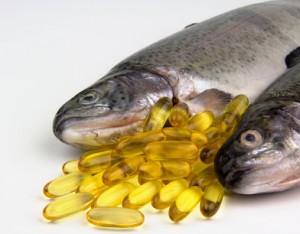Fish, Fish Oils And Prostate Cancer
Author: Dr. Stephen Chaney
 My phone has been ringing off the hook. My email in-box is full. It seems that everyone wants to know if the headlines about omega-3 fatty acids and prostate cancer are true.
My phone has been ringing off the hook. My email in-box is full. It seems that everyone wants to know if the headlines about omega-3 fatty acids and prostate cancer are true.
In case you have just gotten back from a vacation on some deserted island with no newspapers and no internet, let me bring you up to date. The headlines are saying things like “Fish Oils May Increase Your Risk of Prostate Cancer” and “Latest Study Links Fish Oils to Prostate Cancer”.
Once again, it seems like just when you’ve figured out which foods that are good for you, someone tells you they could actually kill you. It’s no wonder so many of you have been asking me to cut through the hype and put this latest study in perspective.
What the study actually says:
As usual, let me start with the study itself (Brasky et al., Journal of the National Cancer Institute, doi: 10.1093/jnci/djt174). On the surface, it appears to be a reasonably well designed study, and the conclusions were dramatic. They reported that subjects with high levels of omega-3 fatty acids in their blood were 43% more likely to develop prostate cancer, 44% more likely to develop low grade prostate cancer, and 71% more likely to develop high grade prostate cancer compared to those with low levels of omega-3 fatty acids in their blood.
The flaws in the study:
Case closed you might be tempted to say. However, once you dig a little deeper, the study does have two important weaknesses.
1) It used data from another study that was designed for a totally different purpose. They went back and analyzed blood samples from a previous study that was actually designed to measure the association between vitamin E and selenium intake and prostate cancer. That’s a scientific no-no. Let me explain why.
If they had designed a study to investigate the association between omega-3 fatty acids and prostate cancer, they probably would have selected participants with a wide range of omega-3 fatty acids in their blood at the beginning of the study. The subjects in this study actually had a very narrow range of omega-3 fatty acids in their bloodstream.
They also would probably have done a diet analysis and found out whether the subject’s omega-3 fatty acids were coming from fish or fish oil supplements. They might have even asked whether the omega-3 fatty acids were from farm-raised fish or inexpensive fish oil supplements known to be contaminated with PCBs. This study collected none of these data.
2) This is a single study, and individual studies often provide misleading results. For example, if you examine their data closely, it looks like heavy drinkers and smokers might have a decreased risk of prostate cancer. I think that’s unlikely, but weird associations like that often pop up in individual studies.
What do you find when you look at other studies?
Expert scientists aren’t swayed by individual studies. We prefer to look at the “big picture” that emerges when you combine the results of many studies. For example, a meta-analysis of 24 studies with 461,402 subjects (Symanski et al, American Journal of Clinical Nutrition, 92: 1223-1233, 2010) found no association between fish consumption and prostate cancer risk.
Individual studies ranged from a 61% decrease in risk to a 77% increase in risk, but the overall effect was zero! Even more importantly, fish consumption decreased prostate cancer deaths by 63%.
The Bottom Line:
1) Don’t panic. Don’t change what you are doing based on the latest sensational headlines. This study has been way overblown. We have come to expect sensational headlines and hype from journalists and bloggers because that’s how they get people to read what they write.
However, I find the comment from the senior author that “We’ve shown once again that use of nutritional supplements may be harmful” to be very irresponsible, especially since they have no data showing that anyone in their study actually used fish oil supplements.
2) The benefits of assuring optimal omega-3 fatty acid intake clearly overshadow the risks. Omega-3 fatty acids have been shown to lower triglycerides and blood pressure, reduce inflammation and depression, and may even help prevent dementia.
3) This study does raise a caution flag, but I would not recommend reducing your omega-3 fatty acid intake on the basis of these data alone – especially since most published studies show no increased risk of prostate cancer. There are much better designed studies underway that should clearly show an increase in prostate cancer risk if it is a real effect. I will monitor those studies closely and keep you abreast of any new developments.
These statements have not been evaluated by the Food and Drug Administration. This information is not intended to diagnose, treat, cure or prevent any disease.





